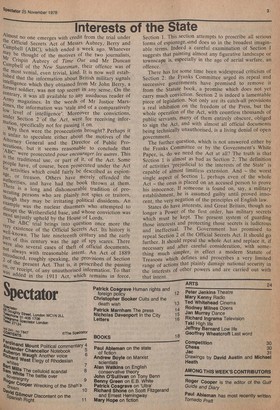Interests of the State
Almost no one emerges with credit from the trial under the Official Secrets Act of Messrs Aubrey,' Berry and Campbell (ABC), which ended a week ago. Whatever may he thought of the motives of the two journalists, Mr Crispin Aubrey of Time Out and Mr Duncan Campbell of the New Statesman, their offence was of the most venial, even trivial, kind. It is now well estab lished that the information about British military signals Intelligence which they obtained from Mr John Berry, a former soldier, was not top secret in any sense. On the contrary, it was all available to any assiduous reader of Army magazines. In the words of Mr Justice Mars ',ones. the information was 'stale and of a comparatively tow level of intelligence'. Moreover the convictions, tinder Section 2 of the Act, were for receiving inforIllation, specifically not for passing it on. : Why then were the prosecutions brought? Perhaps it IS unfair to speculate either about the motives of the ilttorney General and the Director of Public Pro "'cations, but it seems reasonable to conclude that iA8C' were prosecuted pour encourager les autres. This s the traditional use, or part of it, of the Act. Some People have, of course, been prosecuted under the Act for activities which could fairly be described as espion4,ge, or treason. Others have merely offended the '4_,11,thorities, and have had the book thrown at them. s'ere is a long and dishonourable tradition of proen tkeuting persons who are plainly not spies or traitors, e"ough they may be irritating political dissidents. An disrupt was the nuclear disarmers who attempted to `:„..'srupt the Wethersfield base, and whose conviction was 'n°,Thst unjustly upheld by the House of Lords. The ABC trial brings into question once more the 'rX existence of the Official Secrets Act. Its history is w ,e11-known. The late nineteenth century and the early Part of this century was the age of spy scares. There ere also several cases of theft of official documents, i._(:"t always with treasonable intent. An Act of 1889 introduced, roughly speaking, the provisions of Section (430f the present Act. That is, it proscribed the passing or receipt, of any unauthorised information. To that wcts added in the 1911 Act, which remains in force, Section 1. This section attempts to proscribe all serious forms of espionage,..and does so in the broadest imaginable terms. Indeed a careful examination of Section I suggests that painting almost any figurative landscape or townscape is, especially in the age of aerial warfare, an offence. There has for some time been widespread criticism of Section 2: the Franks Committee urged its repeal and successive governments have promised to remove it from the Statute book, a promise which does not yet carry much conviction. Section 2 is indeed a lamentable piece of legislation. Not only are its catch-all provisions a real inhibition on the freedom of the Press, but the whole operation of the Act, with countless thousands of public servants, many of them entirely obscure, obliged to sign the Act, and with almost all official documents being technically unauthorised, is a living denial of open government. The further question, which is not answered either by the Franks Committee or by the Government's White Paper, is, do we need the Act at all? The truth is that Section 1 is almost as bad as Section 2. The definition of activities 'prejudicial to the interests of the State' is capable of almost limitless extension. And — the worst single aspect of Section 1, perhaps even of the whole i Act — the onus s placed on an accused person to prove his innocence. If someone is found on, say, a military establishment, he is assumed guilty until proved innocent, the very negation of the principles of English law. States do have interests, and Great Britain, though no longer a Power of the first order, has military secrets which must be kept. The present system of guarding those interests and protecting those secrets is ludicrous and ineffectual. The Government has promised to repeal Section 2 of the Official Secrets Act. It should go further. It should repeal the whole Act and replace it, if necessary and after careful consideration, with something much simpler, in effect a modern Statute of Treasons which defines and proscribes a very limited range of actions that plainly damage national security in the interests of other powers and are carried out with that intent.


































 Previous page
Previous page